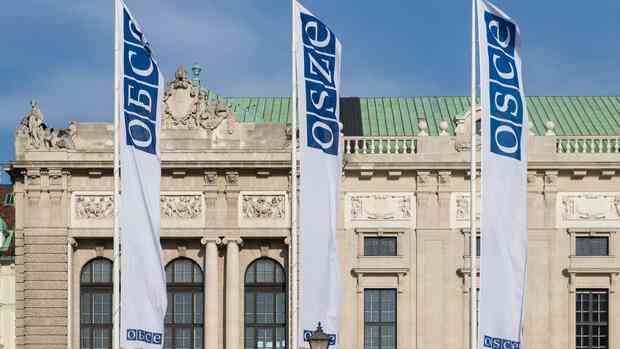Who will travel to the OSCE Assembly in Vienna on the anniversary of the Russian invasion is still completely open.
(Photo: AP)
Vienna It would be a nightmare for many: around the anniversary of the Ukraine war, the international community is sitting around a table to talk about the current situation – but a delegation from the Russian aggressor is also present, using the meeting for propaganda purposes.
In fact, the probability of this scenario coming true on February 23rd and 24th increases. That is when the Parliamentary Assembly (PA) of the Organization for Security and Co-operation in Europe (OSCE) takes place in Vienna.
The debate about whether to simply uninvite the member country Russia is increasingly being a crucial test for the OSCE. The central questions are: Can the Ukrainian representatives be expected to sit in the same room as the aggressor’s deputies? And does the meeting give Russia a platform for propaganda?
The case is now being debated more and more emotionally. The head of the Ukrainian delegation, Mykyta Poturayev, wrote a letter to Swedish PA President Margareta Cederfelt on February 13, asking her to postpone the meeting. This is necessary to protect the integrity of the assembly.
If the Russian delegation takes part in the meeting, the Ukrainian representatives will stay away from the event.
Members of parliament from 20 countries had previously asked Austria to prevent the visit of the Russian delegation to Vienna. This could happen, for example, by the country refusing the visa.
However, Austria does not want to know anything about this, as the Foreign Ministry emphasizes. The OSCE is based in Vienna, which is why there is a so-called headquarters agreement between the organization and Austria. It states that delegates “must not be impeded in their travel to and from OSCE Headquarters”.
Austria wants to issue visas to Russian OSCE MPs
Austria’s Foreign Minister Alexander Schallenberg has therefore repeatedly emphasized that his country has no choice when it comes to the visa issue. This is a must and not an optional provision, he said on Austrian television ORF.
Furthermore, Schallenberg is convinced that the Russian delegation should not be denied access for diplomatic reasons. “We need platforms like the OSCE,” he said. There is no multilateralism à la carte, and the OSCE has never been an organization of like-minded people since it was founded in 1975.
In any case, the day-to-day business of the OSCE continues as usual. The OSCE ambassadors from the member countries continue to meet once a week in the Vienna Hofburg.
This is how the Handelsblatt reports on the Ukraine war:
Political scientists and international law experts support Schallenberg’s view. For example, they expressed the opinion in the media that multilateral organizations are designed for inclusion and not exclusion. However, some pointed out that Russia’s attack on Ukraine was condemned by a large majority in the United Nations. Therefore, the OSCE would also have the opportunity to take action.
It is clear that among the Russia delegates there are very dubious figures. Leonid Slutsky spoke of the “denazification” of Ukraine. The OSCE delegates are sent by the national parliaments, in the case of Russia by the Duma. The EU has imposed sanctions on all members of the Duma.
Although not only Ukraine will at best boycott the meeting, but also the Baltic states have indicated this, the OSCE does not want to make any compromises. “The meeting will take place,” spokesman Nat Parry said on Wednesday.
It represents an opportunity to directly confront Russian officials with criticism. Primary President Cederfelt is working on a solution.
Russia last attended an OSCE meeting in 2021. At the two most recent gatherings, the host countries, Britain and Poland, refused visas to the Russian delegation.
The Russians recently planned to take part in the meeting in Vienna. At the beginning of February, the Russian foreign policy expert Vladimir Dschabarov said in a newspaper interview: “We are now dealing with obtaining the visa and preparing for the trip. I think everything will be normal.”
More: The circle of power – these are Vladimir Putin’s closest confidants
